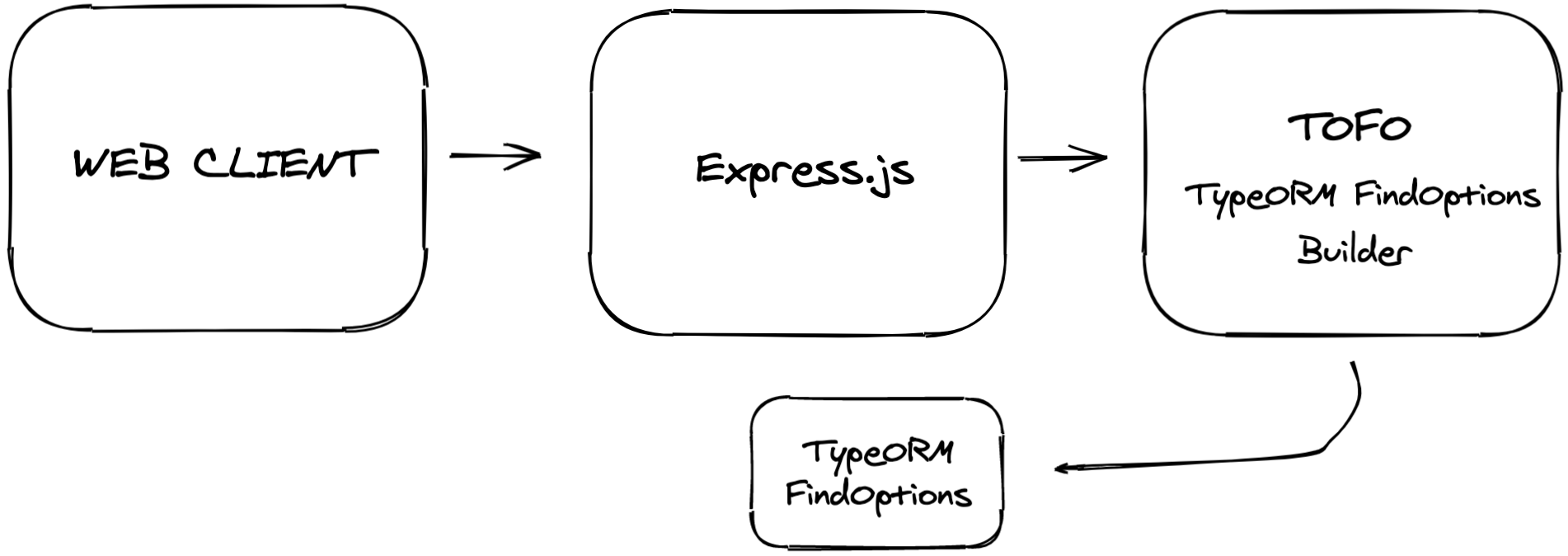tofo
v1.4.4
Published
Easily transform an url query into TypeORM FindOption
Downloads
34
Maintainers
Readme
TOFO - TypeORM FindOptions Builder
TOFO stand for TypeORM FindOptions. this library allows you to transform automatically url query into TypeORM FindOptions queries.
Installation
npm install tofo
How it works?

Usage
Quick Start
Use FindOptionBuilder export from package and pass your req.query as an argument.
Given the following url query string:
foo/?name__contains=foo&role__in=admin,common&age__gte=18&page=3&limit=10
Then build the query into FindOptions
import { FindOptionBuilder } from 'tofo';
const builder = new FindOptionBuilder(req.query);
const builtQuery = builder.build();It will be transformed into:
{
where: {
foo: Like('%foo%'),
role: In(['admin', 'common']),
age: MoreThanOrEqual(18)
},
skip: 20,
take: 10
}Now your query is builted, pass it to your TypeORM repository.
const results = await fooRepository.find(builtQuery);For another available syntax can be found in here:
Allowed Fields
By default, tofo accepting all fields passed in req.query. If you need to filtering for only some fields you can use setAllowedFields() function.
// Let's say this query got from req.query
const query = { name: "foo", status: "active", location: "Sukowati", limit: 5 };
const builder = new FindOptionBuilder(query);
// Set allowed fields
builder.setAllowedFields(['limit']);
builder.setAllowedFields(['name', 'status']);
// Build query
const builtQuery = builder.build();It will be transformed into:
{
skip: 0,
take: 5,
where: {
name: 'foo',
status: 'active'
},
}WARNING: you also need to set allowed builtin query options keys if needed, otherwise the keys will be removed before build.
Using POST method to retrieve data
Instead using req.query from GET method, you also can send data using POST method and retrieve the data from req.body.
curl --location --request POST 'http://localhost/api/foo' \
--header 'Content-Type: application/json' \
--data-raw '{
"name": "foo",
"status": "active"
}'And handle data like
app.post('/api/foo', (req, res) => {
const builder = new FindOptionBuilder(req.body); // => Process data from req.body
const builtQuery = builder.build();
})Available Lookups
| Lookup | Behaviour | Example |
| --- | --- | --- |
(none) | Return entries that match with value | foo=raul
contains | Return entries that contains value | foo__contains=lopez
startswith | Return entries that starts with value | foo__startswith=r
endswith | Return entries that ends with value | foo__endswith=dev
isnull | Return entries with null value | foo__isnull
lt | Return entries with value less than or equal to provided | foo__lt=18
lte | Return entries with value less than provided | foo__lte=18
gt | Returns entries with value greater than provided | foo__gt=18
gte | Return entries with value greater than or equal to provided | foo__gte=18
in | Return entries that match with values in list | foo__in=admin,common
between | Return entries in range | foo__between=1,27
Notice
You can use negative logic prefixing lookup with __not. Example: foo__not__contains=value
Querying a column from an embedded entity. Example: user.name=value
OR condition union
// ?$or=name:juste|age__gte:15&$or=user.role:admin
{
where: [
{ name: 'juste', age: MoreThanOrEqual('15') },
{ user: { role: 'admin' } }
]
}
// ?city=Dahomey&$or=name:juste|age__gte:15&$or=user.role:admin
{
where: [
{ name: 'juste', city: 'Dahomey', age: MoreThanOrEqual('15') },
{ user: { role: 'admin' }, city: 'Dahomey' }
]
}Query Option Keys
| Option | Default | Behaviour | Example |
| --- | :---: | --- | --- |
pagination | true | If true, paginate results. If false, disable pagination | pagination=false
page | 1 | Return entries for page page | page=2
limit | 25 | Return entries for page page paginated by size limit | limit=15
order | - | Order for fields:^: Ascendant -: Descendant | order=^foo,-name,^surname
join | - | Set relations | join=posts,comments
select | - | Set fields selection | select=name,phoneNumber
NOTE: If you using
AllowedFieldsyou also need to include these option keys also.
Available Methods
Remove precautionary fields from the query before building
removeField(field: string): FindOptionBuilderSet Allowed Fields from the query before building
setAllowedFields(['allowed_field1', 'allowed_field2']): FindOptionBuilderOthers
You can use the frontend query builder to go faster without having to worry too much about the syntax.
